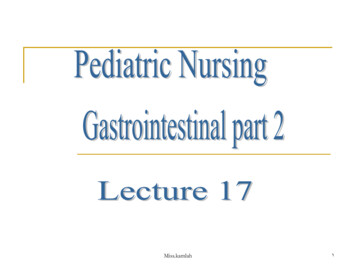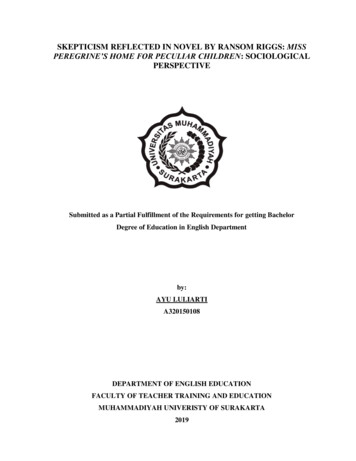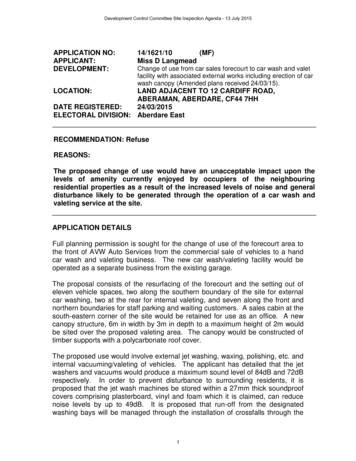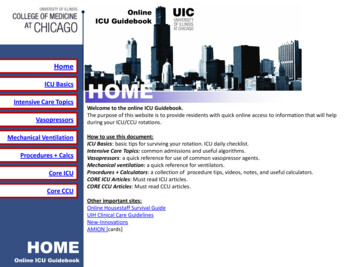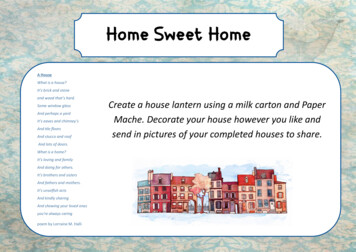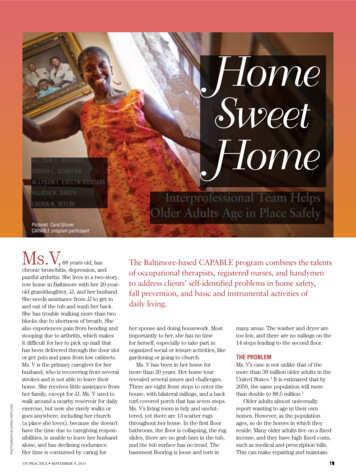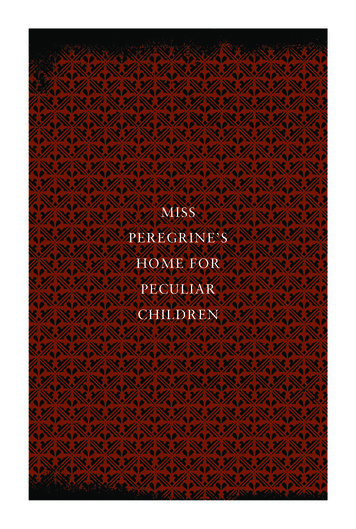
Transcription
orphans interior4B:Layout 112/13/104:19 PMPage 1MISSPEREGRINE’SHOME FORPECULIARCHILDREN
orphans interior4B:Layout 112/13/104:19 PMPage 2
orphans interior4B:Layout 112/13/104:19 PMPage 3
orphans interior4B Layout 1 3/2/11 11:20 AM Page 4Copyright 2011 by Ransom RiggsAll rights reserved. No part of this book may be reproduced in any formwithout written permission from the publisher.Library of Congress Cataloging in Publication Number: 2010942876ISBN: 978-1-59474-476-1Printed in ChinaTypeset in SabonDesign by Doogie HornerCover photograph courtesy of Yefim TovbisProduction management by John J. McGurkQuirk Books215 Church StreetPhiladelphia, PA 19106quirkbooks.com10 9 8 7 6 5 4 3 2 1
orphans interior4B:Layout 112/13/104:19 PMPage 5Sleep is not, death is not;Who seem to die live.House you were born in,Friends of your spring-time,Old man and young maid,Day’s toil and its guerdon,They are all vanishing,Fleeing to fables,Cannot be moored.—Ralph Waldo Emerson
orphans interior4B:Layout 112/13/104:19 PMPage 6
orphans interior4B:Layout 112/13/104:19 PMPage 7PROLOGUE
orphans interior4B:Layout 112/13/10I4:19 PMPage 8had just come to accept that my life would be ordinarywhen extraordinary things began to happen. The firstof these came as a terrible shock and, like anything thatchanges you forever, split my life into halves: Before and After. Likemany of the extraordinary things to come, it involved my grandfather,Abraham Portman.Growing up, Grandpa Portman was the most fascinating personI knew. He had lived in an orphanage, fought in wars, crossed oceansby steamship and deserts on horseback, performed in circuses, kneweverything about guns and self-defense and surviving in the wilderness, and spoke at least three languages that weren’t English. It allseemed unfathomably exotic to a kid who’d never left Florida, and Ibegged him to regale me with stories whenever I saw him. He alwaysobliged, telling them like secrets that could be entrusted only to me.When I was six I decided that my only chance of having a lifehalf as exciting as Grandpa Portman’s was to become an explorer.He encouraged me by spending afternoons at my side hunched overmaps of the world, plotting imaginary expeditions with trails of redpushpins and telling me about the fantastic places I would discoverone day. At home I made my ambitions known by parading aroundwith a cardboard tube held to my eye, shouting, “Land ho!” and“Prepare a landing party!” until my parents shooed me outside. Ithink they worried that my grandfather would infect me with someincurable dreaminess from which I’d never recover—that these fan-8
orphans interior4B:Layout 112/13/104:19 PMPage 9tasies were somehow inoculating me against more practical ambitions—so one day my mother sat me down and explained that Icouldn’t become an explorer because everything in the world had already been discovered. I’d been born in the wrong century, and I feltcheated.I felt even more cheated when I realized that most of GrandpaPortman’s best stories couldn’t possibly be true. The tallest tales werealways about his childhood, like how he was born in Poland but attwelve had been shipped off to a children’s home in Wales. When Iwould ask why he had to leave his parents, his answer was always thesame: because the monsters were after him. Poland was simply rotten with them, he said.“What kind of monsters?” I’d ask, wide-eyed. It became a sortof routine. “Awful hunched-over ones with rotting skin and blackeyes,” he’d say. “And they walked like this!” And he’d shamble afterme like an old-time movie monster until I ran away laughing.Every time he described them he’d toss in some lurid new detail:they stank like putrefying trash; they were invisible except for theirshadows; a pack of squirming tentacles lurked inside their mouthsand could whip out in an instant and pull you into their powerfuljaws. It wasn’t long before I had trouble falling asleep, my hyperactive imagination transforming the hiss of tires on wet pavement intolabored breathing just outside my window or shadows under the doorinto twisting gray-black tentacles. I was scared of the monsters butthrilled to imagine my grandfather battling them and surviving to tellthe tale.More fantastic still were his stories about life in the Welsh children’s home. It was an enchanted place, he said, designed to keepkids safe from the monsters, on an island where the sun shined everyday and nobody ever got sick or died. Everyone lived together in a bighouse that was protected by a wise old bird—or so the story went. AsI got older, though, I began to have doubts.9
orphans interior4B:Layout 112/13/104:19 PMPage 10“What kind of bird?” I asked him one afternoon at age seven,eyeing him skeptically across the card table where he was letting mewin at Monopoly.“A big hawk who smoked a pipe,” he said.“You must think I’m pretty dumb, Grandpa.”He thumbed through his dwindling stack of orange and bluemoney. “I would never think that about you, Yakob.” I knew I’d offended him because the Polish accent he could never quite shake hadcome out of hiding, so that would became vood and think becamesink. Feeling guilty, I decided to give him the benefit of the doubt.“But why did the monsters want to hurt you?” I asked.“Because we weren’t like other people. We were peculiar.”“Peculiar how?”“Oh, all sorts of ways,” he said. “There was a girl who couldfly, a boy who had bees living inside him, a brother and sister whocould lift boulders over their heads.”It was hard to tell if he was being serious. Then again, mygrandfather was not known as a teller of jokes. He frowned, readingthe doubt on my face.“Fine, you don’t have to take my word for it,” he said. “I gotpictures!” He pushed back his lawn chair and went into the house,leaving me alone on the screened-in lanai. A minute later he cameback holding an old cigar box. I leaned in to look as he drew out fourwrinkled and yellowing snapshots.The first was a blurry picture of what looked like a suit ofclothes with no person in them. Either that or the person didn’t havea head.“Sure, he’s got a head!” my grandfather said, grinning. “Onlyyou can’t see it.”“Why not? Is he invisible?”“Hey, look at the brain on this one!” He raised his eyebrows asif I’d surprised him with my powers of deduction. “Millard, his name10
orphans interior4B:Layout 112/13/104:19 PMPage 11was. Funny kid. Sometimes he’d say, ‘Hey Abe, I know what you didtoday,’ and he’d tell you where you’d been, what you had to eat, ifyou picked your nose when you thought nobody was looking. Sometimes he’d follow you, quiet as a mouse, with no clothes on so youcouldn’t see him—just watching!” He shook his head. “Of all thethings, eh?”He slipped me another photo. Once I’d had a moment to lookat it, he said, “So? What do you see?”“A little girl?”“And?”“She’s wearing a crown.”He tapped the bottom of the picture. “What about her feet?”I held the snapshot closer. The girl’s feet weren’t touching theground. But she wasn’t jumping—she seemed to be floating in the air.My jaw fell open.“She’s flying!”“Close,” my grandfather said. “She’s levitating. Only she couldn’t control herself too well, so sometimes we had to tie a rope aroundher to keep her from floating away!”My eyes were glued to her haunting, doll-like face. “Is it real?”“Of course it is,” he said gruffly, taking the picture and replacing it with another, this one of a scrawny boy lifting a boulder. “Victor and his sister weren’t so smart,” he said, “but boy were theystrong!”“He doesn’t look strong,” I said, studying the boy’s skinny arms.“Trust me, he was. I tried to arm-wrestle him once and he justabout tore my hand off!”But the strangest photo was the last one. It was the back ofsomebody’s head, with a face painted on it.11
orphans interior4B:Layout 112/13/104:20 PMPage 12
orphans interior4B:Layout 112/13/104:20 PMPage 13
orphans interior4B:Layout 112/13/104:21 PMPage 14
orphans interior4B:Layout 112/13/104:21 PMPage 15
orphans interior4B:Layout 112/13/104:21 PMPage 16I stared at the last photo as Grandpa Portman explained. “Hehad two mouths, see? One in the front and one in the back. That’swhy he got so big and fat!”“But it’s fake,” I said. “The face is just painted on.”“Sure, the paint’s fake. It was for a circus show. But I’m tellingyou, he had two mouths. You don’t believe me?”I thought about it, looking at the pictures and then at my grandfather, his face so earnest and open. What reason would he have to lie?“I believe you,” I said.And I really did believe him—for a few years, at least—thoughmostly because I wanted to, like other kids my age wanted to believein Santa Claus. We cling to our fairy tales until the price for believing them becomes too high, which for me was the day in second gradewhen Robbie Jensen pantsed me at lunch in front of a table of girlsand announced that I believed in fairies. It was just deserts, I suppose, for repeating my grandfather’s stories at school but in those humiliating seconds I foresaw the moniker “fairy boy” trailing me foryears and, rightly or not, I resented him for it.Grandpa Portman picked me up from school that afternoon, ashe often did when both my parents were working. I climbed into thepassenger seat of his old Pontiac and declared that I didn’t believe inhis fairy stories anymore.“What fairy stories?” he said, peering at me over his glasses.“You know. The stories. About the kids and the monsters.”He seemed confused. “Who said anything about fairies?”I told him that a made-up story and a fairy tale were the samething, and that fairy tales were for pants-wetting babies, and that Iknew his photos and stories were fakes. I expected him to get mad orput up a fight, but instead he just said, “Okay,” and threw the Pontiac into drive. With a stab of his foot on the accelerator we lurchedaway from the curb. And that was the end of it.I guess he’d seen it coming—I had to grow out of them eventu-16
orphans interior4B:Layout 112/13/104:21 PMPage 17ally—but he dropped the whole thing so quickly it left me feeling likeI’d been lied to. I couldn’t understand why he’d made up all that stuff,tricked me into believing that extraordinary things were possiblewhen they weren’t. It wasn’t until a few years later that my dad explained it to me: Grandpa had told him some of the same storieswhen he was a kid, and they weren’t lies, exactly, but exaggeratedversions of the truth—because the story of Grandpa Portman’s childhood wasn’t a fairy tale at all. It was a horror story.My grandfather was the only member of his family to escapePoland before the Second World War broke out. He was twelve yearsold when his parents sent him into the arms of strangers, putting theiryoungest son on a train to Britain with nothing more than a suitcaseand the clothes on his back. It was a one-way ticket. He never saw hismother or father again, or his older brothers, his cousins, his auntsand uncles. Each one would be dead before his sixteenth birthday,killed by the monsters he had so narrowly escaped. But these weren’tthe kind of monsters that had tentacles and rotting skin, the kind aseven-year-old might be able to wrap his mind around—they weremonsters with human faces, in crisp uniforms, marching in lockstep,so banal you don’t recognize them for what they are until it’s too late.Like the monsters, the enchanted-island story was also a truthin disguise. Compared to the horrors of mainland Europe, the children’s home that had taken in my grandfather must’ve seemed like aparadise, and so in his stories it had become one: a safe haven of endless summers and guardian angels and magical children, who couldn’t really fly or turn invisible or lift boulders, of course. Thepeculiarity for which they’d been hunted was simply their Jewishness.They were orphans of war, washed up on that little island in a tide ofblood. What made them amazing wasn’t that they had miraculouspowers; that they had escaped the ghettos and gas chambers was miracle enough.I stopped asking my grandfather to tell me stories, and I think17
orphans interior4B:Layout 112/13/104:22 PMPage 18secretly he was relieved. An air of mystery closed around the detailsof his early life. I didn’t pry. He had been through hell and had a rightto his secrets. I felt ashamed for having been jealous of his life, considering the price he’d paid for it, and I tried to feel lucky for the safeand unextraordinary one that I had done nothing to deserve.Then, a few years later, when I was fifteen, an extraordinaryand terrible thing happened, and there was only Before and After.18
orphans interior4B:Layout 112/13/104:22 PMPage 19CHAPTER ONE
orphans interior4B:Layout 112/13/10I4:22 PMPage 20spent the last afternoon of Before constructing a1/10,000-scale replica of the Empire State Building fromboxes of adult diapers. It was a thing of beauty, really,spanning five feet at its base and towering above the cosmetics aisle,with jumbos for the foundation, lites for the observation deck, andmeticulously stacked trial sizes for its iconic spire. It was almost perfect, minus one crucial detail.“You used Neverleak,” Shelley said, eyeing my craftsmanship witha skeptical frown. “The sale’s on Stay-Tite.” Shelley was the store manager, and her slumped shoulders and dour expression were as much apart of her uniform as the blue polo shirts we all had to wear.“I thought you said Neverleak,” I said, because she had.“Stay-Tite,” she insisted, shaking her head regretfully, as if mytower were a crippled racehorse and she the bearer of the pearl-handled pistol. There was a brief but awkward silence in which she continued to shake her head and shift her eyes from me to the tower andback to me again. I stared blankly at her, as if completely failing tograsp what she was passive-aggressively implying.“Ohhhhhh,” I said finally. “You mean you want me to do itover?”“It’s just that you used Neverleak,” she repeated.“No problem. I’ll get started right
MISS PEREGRINE’S HOME FOR PECULIAR CHILDREN orphans_interior4B:Layout 1 12/13/10 4:19 PM Page 1
